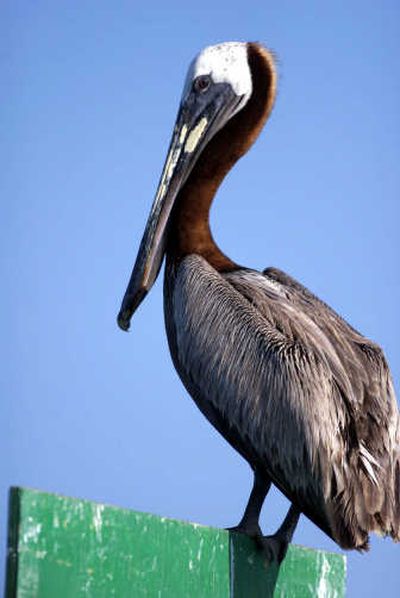Brown pelicans back from the brink

Pelicans have roosted on the nation’s list of endangered species longer than nearly all other creatures. Now the population of winged icons of America’s surf and sand is about to be officially declared healthy.
The U.S. Interior Department on Friday announced a proposal to remove brown pelicans from the national endangered species list, 40 years after they hovered on the brink of extinction.
A single threat caused most pelican populations to plummet, and a single savior brought them back.
Pelicans suffered almost complete reproductive failure in the 1960s and early 1970s because the pesticide DDT accumulated in their bodies, weakening their eggs and killing chicks. When DDT was banned in the United States in 1972, the species started to rebound.
Today, more than 70,000 breeding pelicans inhabit California and Baja California, and total numbers have surged to about 620,000 along the coasts of the United States, the Caribbean and Latin America.
In announcing the proposal, H. Dale Hall, director of the U.S. Fish and Wildlife Service, said the fish-eating, long-lived birds no longer are threatened with extinction, “either in the foreseeable future or in the long term.”
“This species has had a long journey,” Hall said. “This is truly a success story.”
For several decades, the plight of the pelican has symbolized the fragility of nature as well as its fortitude. Their near-extinction illustrated not only what can go terribly wrong when man-made chemicals such as DDT build up in the environment, but the ability of nature to rebound once the chemicals are removed.
“The pelican is one of the best indicators of environmental health,” said Daniel Anderson, an ecotoxicologist at the University of California, Davis, who has studied California pelicans since 1971. “When you see a flock of pelicans fly by, you think all’s well out there. When you don’t see them, then you know something’s wrong.”
DDT is banned worldwide except for limited applications in malaria-plagued Africa. But it is slow to break down, and residue remains in ocean ecosystems, as well as in human bodies, around the world.
The proposed delisting includes the California brown pelican as well as subspecies along the Gulf Coast, the Caribbean and Central and South America. The Atlantic Coast population was removed from the list in 1985. The agency will seek public comments for 60 days, and its proposal could become final in one year.